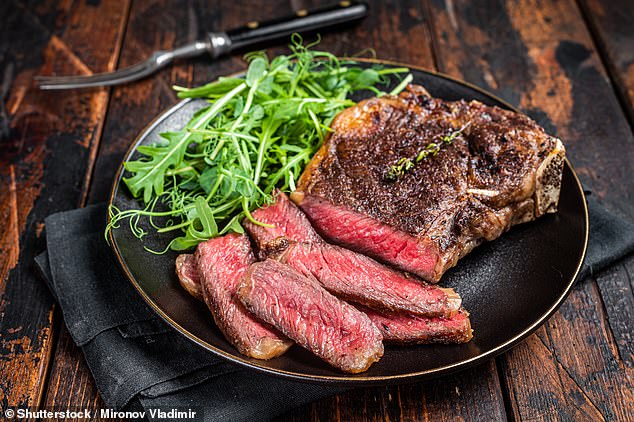[ad_1]
Eating lean beef could be less damaging to your gut than eating chicken, according to a controversial new study.
While red and processed meat have been linked to an increased risk of bowel cancer and heart disease, poultry had, until now, been considered a less risky source of protein.
In the study, Spanish researchers analysed how chicken and beef affected the gut microbiome of 16 healthy individuals, mostly aged between 18 and 22-years-old.
They found that whilst both diets—which were followed for a period of eight weeks— had an impact on gut bacteria, the chicken-based diet was associated with a significant decrease in microbial diversity and richness.
The gut microbiome—the community of friendly bacteria that live in the gut and communicate with the brain—is essential for protecting against infection and disease.
After eating a chicken-based diet, participants were also found to have higher levels of harmful bacteria in the gut, which has been linked with a number of diseases including bowel cancer.
Interestingly, they found that the beef-based diet led to a significant increase in Blautia bacteria which plays a key role in protecting the mucus barrier in the gut, warding off inflammation and disease.
In the study, participants were instructed to follow their usual diet and randomly assigned to eat Pirenaica beef—which is naturally high in potassium, zinc and vitamin B—or chicken three times a week.

Researchers concluded that lean beef was less damaging to gut health, boosting healthy healthy bacteria and supporting the production of essential amino acids
Chefs prepared the cuts using standardised cooking methods including grilling, stewing and roasting.
The nutritional value of both diets, including protein and fat sources, were similar in both groups.
Participants then had a wash-out period of five weeks between the two diets, in which they resumed their normal diet.
Stool samples were collected at the beginning and end of each diet-period.
The researchers found that the chicken-based diet negatively affected the body’s ability to process glucose—a type of sugar—which interfered with blood sugar levels.
Blood sugar levels often change in the day but it is important to try and keep levels stable.
According to the NHS, low blood sugar below 4mmol/L can be dangerous if left untreated causing seizures, sleep disturbances, loss of consciousness and heart palpitations.
They also found that this diet lead to a decrease in the production of amino acids—the building blocks of proteins—which are essential for immune function and gut health.

The researchers included a five-week reset period between te beef and chicken diet phases to allow participants’ gut bacteria to return to baseline before switching meats
Writing in the journal Molecular Nutrition and Food Research, they concluded: ‘These findings suggests that the integration of lean red meat from beef into a healthy dietary pattern could positively influence not only the gut microbiome but also some health indicators.’
The study had several limitations which the authors acknowledged.
One is that although dietary intake was assessed using a questionnaire and diet quality was considered, diet was self-reported which means some foods that could have a significant impact on gut bacteria may have been missed.
It comes as concerning research has suggested that regularly eating chicken could double the risk of dying from 11 different types of cancer, including bowel and stomach.
Italian researchers found those who consumed over 300g of poultry—equivalent to about four portions—per week, had double the risk of dying from a digestive cancer, compared to those who ate less than one portion.
Whilst they admitted they couldn’t be sure why this increased risk occurred they theorised that it could be due to high cooking temperatures or the feed given to poultry.
According to Cancer Research UK, 21 per cent of bowel cancer cases are caused by eating red or processed meats.
Scientists believe this is linked to certain chemicals naturally present in meat, introduced during processing of produced when it is cooked as high temperatures.
However, the NHS states that eating meat, as part of healthy balanced diet, helps provide protein which builds and repairs muscles, as well as produces hormones and enzymes.
Meat is also rich in vitamin B12, a key component in keeping the nervous system healthy.
The health service advises people who eat about 90g red meat — about three thin slices of roast beef — per day to try and cut down to 70g.
[ad_2]
This article was originally published by a www.dailymail.co.uk . Read the Original article here. .

